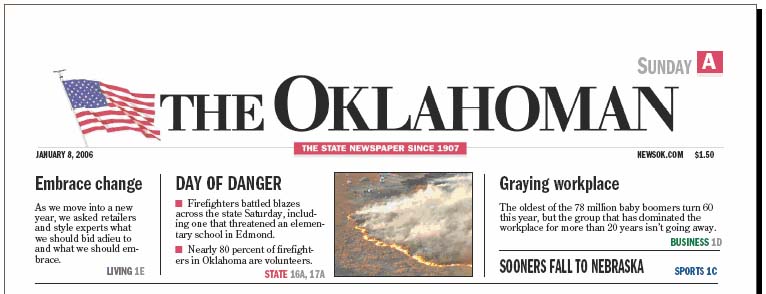
.jpg)
BY NATE BILLINGS THE OKLAHOMAN Margaret Gaeddert works Thursday from her home office in Oklahoma City. Gaeddert is a 54-yearold woman seeking a full-time job while doing freelance art direction projects from her home.

.jpg)
BY NATE
BILLINGS THE OKLAHOMAN Margaret Gaeddert works Thursday from her home
office in Oklahoma City. Gaeddert is a 54-yearold woman seeking a full-time job
while doing freelance art direction projects from her home.
The
oldest of the nation’s 78 million baby boomers turn 60 this year, but the group
that has dominated the workplace for more than 20 years won’t relinquish much of
its influence anytime soon, experts say. “It’s going to continue for a while,”
said Joy Reed Belt, owner of an Oklahoma City human resources consulting firm.
“Ultimately you would think the boomers would go away, but what we’re seeing now
with the advent of the longer life span and the fact that many boomers are not
going to be able to live on their retirement, they will stay in the work force
longer than they normally would,” Belt said. In the 2000 census, those born from
1946 through 1964 represented about 28 percent of the nation’s population. But
baby boomers make up about 45 percent of the work force, Belt said. In five
years, they will be about 38 percent of the work force “but that’s still a high
number,” Belt said. Baby boomers were the first workaholics, but they also
ushered in a new era of consumerism. That has produced a diligent, but
free-spending generation approaching retirement with a lack of resources. “The
baby boomers haven’t saved much,” said Lynn Gray, research economist with the
Oklahoma Employment Security Commission. “We’re a little more healthy than were
a generation ago. Work is easier than was a generation ago for a lot of
occupations.” Thus, more older workers plan — or need — to keep working beyond
normal retirement.
Staying busy
Some older workers just don’t want to
stop working, said Jim Farris, owner of James Farris Associates, an Oklahoma
City human resources business.
“The new 30 is
50, and the new 40 is 60,” Farris said. “Somebody that is 60 today isn’t like in
attitude or health or energy level as 60 was 20 years ago. A lot of people
aren’t ready to retire. They’re feeling good about what they do and just aren’t
ready to go fishing yet.”
Many of those older
baby boomers may opt for a job with lower wages and less responsibility, but
with health benefits, Farris said.
The Bureau of
Labor Statistics estimates that people ages 45 to 54 spent an average of $2,695
on health care in 2004, and those costs will increase as baby boomers age. For
instance, those age 55 to 64 spent $3,262 on health care, and those 65 and older
spent $3,899, the bureau reported.
Eventually,
baby boomers impact on the labor force will wane. Recent Bureau of Labor
Statistics estimates show that the departure of aging baby boomers from the work
force over the next decade will lower the overall labor force participation rate
and slow the growth of the nation’s labor force.
That prompts other issues, such as fewer workers
supporting the federal benefits of more retirees.
“It’s kind of a double-edged sword,” Farris
said. “Fewer people will be working to support an ever-enlarging group and the
other side of that is the ever-enlarging group, because they’ve been catered to
and self-indulgent, doesn’t have the money to retire the way they should have.”
Job search
Margaret Gaeddert, a 55-year-old Oklahoma
City graphics designer and art director, has learned that the cracking local
labor market can be a challenge. Gaeddert is seeking what she hopes will be her
last full-time job, but her salary demands and expectations are making it tough
to find what she wants.
“There’s not much out
there for me,” Gaeddert said. “It’s become very difficult for me because for
people in my position, they can’t pay the salary I need here in Oklahoma City.”
Gaeddert’s last job didn’t pay what she wanted,
but she hoped it would provide satisfaction by allowing her to use her
experience and management skills. That didn’t happen, she said.
“We want that opportunity to show that we’ve got
all these skills and knowledge,” she said. “Why can’t we use it? I don’t know if
they’re threatened by us or just don’t want to pay us.”
Gaeddert, who has enough income to be able to
pick and choose, said she may seek a broader position that includes public
relations or marketing.
“I don’t think I’m going
to have trouble finding a job, but I think finding a salary and that creative
flexibility I need at this age is a challenge,” she said.
Belt said she encourages baby boomers to
regularly update their skills so they can compete with their younger colleagues,
the Gen-Xers and Mil- lenniums. Belt’s message to
older workers is to not be intimidated
“Boomers
bring wisdom and advice and loyalty. They want a place to finish their career,”
Belt said. “The kids don’t care. Two to three years to them is a decade.”
That youthful impatience could cost some
companies employees who are unwilling to wait for the departure of baby boomers
who have chosen to extend their careers, Farris said.
“There could be some volatility in job market,”
Farris said. “If I’m not going to get a chance to run the organization because
my boss isn’t retiring until he’s 70 instead at 65, maybe I need to look at
moving where I do get a chance.”


ILLUSTRATION BY CHRIS SCHOELEN, THE OKLAHOMAN GRAPHICS